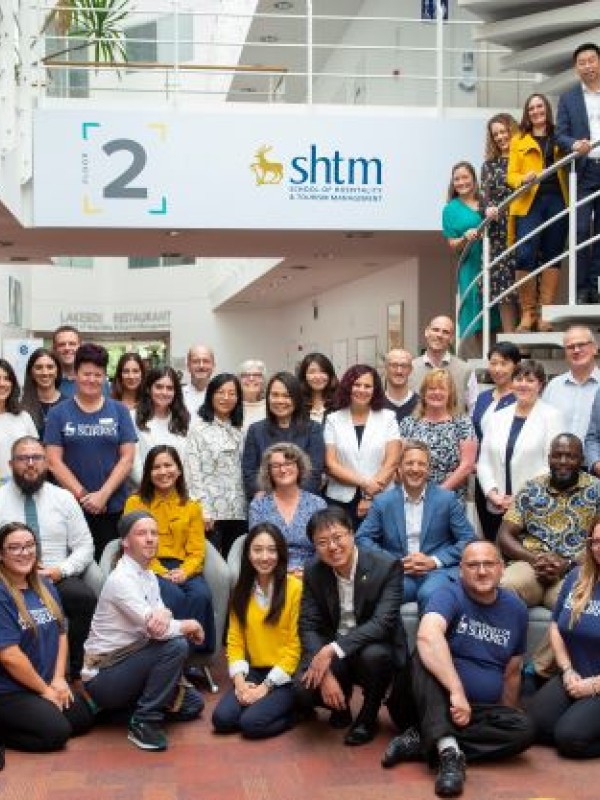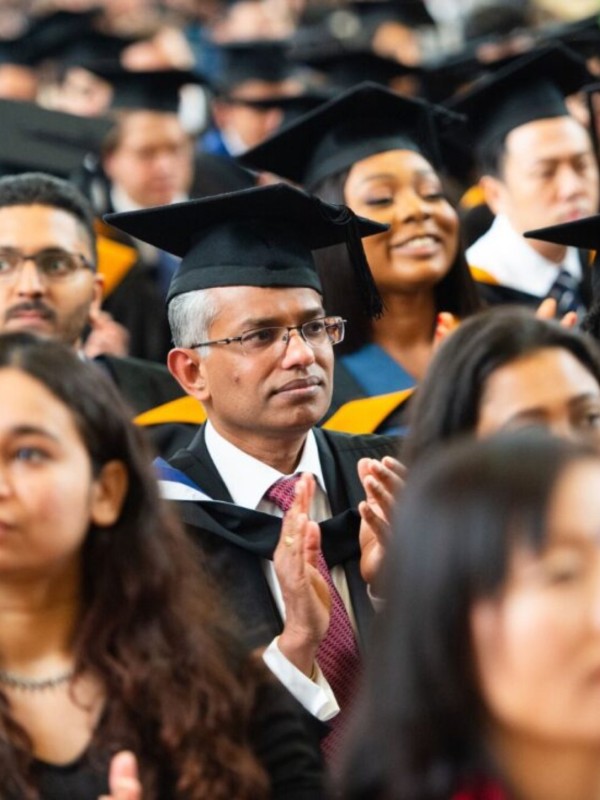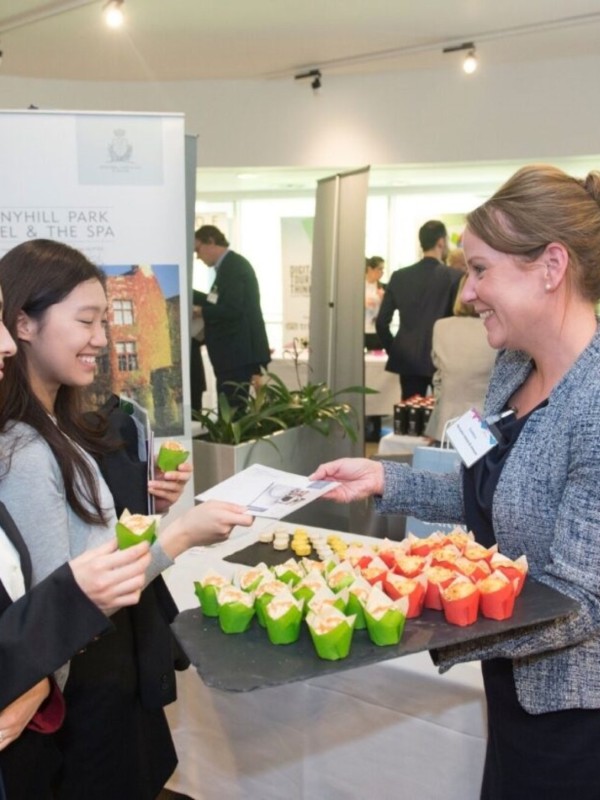
- International Events Management
MSc — 2026 entry International Events Management
The fast-moving events industry is a critical contributor to the global economy. On this programme you'll discover how to create unforgettable events. By blending theory with the hands-on skills employers look for, this course will empower you to make an impact as one of the next generation of events professionals.
4,138+ people have created a bespoke digital prospectus
Why choose
this course?
- This events management degree will provide you with the specialist knowledge, expertise and skills required to succeed in the rapidly evolving events sector.
- During the programme you’ll work in a group to put on a live event, giving you the opportunity to apply, evaluate and build on your learning.
- Our international reputation means you'll learn from tutors who’ve worked in the industry, for example in festivals, experiential marketing and brand activation, sports and non-profit events. Your tutors will also introduce you to guest lecturers working in the event industry who give fascinating up to date insights.
- You’ll have invaluable opportunities to access networks of event managers through these guest lectures and build links to events companies – this has led to some students securing jobs in the event industry as soon as they complete their studies.
- You’ll have plenty of opportunities outside of your core studies to develop your event experience such as working at International Confex, the events industry trade show, and supporting or working at a range of other local and regional events.
- For our events management degree, you won’t need to have an event management undergraduate degree to study this programme; it’s designed to give you all the expertise you need to establish a career in this fast-moving sector.
Statistics
1st in the UK
And 16th in the world for hospitality and leisure management in the QS World University Rankings by Subject 2025
93%
Of our hospitality and tourism management graduates go on to employment or further study (Graduate Outcomes survey 2025, HESA)
3rd in the world
For hospitality and tourism management in the ShanghaiRanking's Global Ranking of Academic Subjects 2025
What you will study
International events are an exciting, dynamic and ever-changing sector of the global economy, which demand creative problem-solvers. Our degree in event management and facilities provide an engaging environment in which you can develop and understand the challenges faced by events professionals.
The course covers valuable management skills such as business analytics, services marketing and strategic planning, and also includes modules that are designed to help you to graduate with specialist events management skills and knowledge.
You will have the opportunity to take part in challenging industry-relevant assessments that will teach you how to design and evaluate different types of events. Importantly, you will produce your own live event as part of a small management team, helping you to develop vital practical skills for your career as an events professional.
In the classroom and beyond, the course team is committed to enhancing your learning in a range of contexts. This also includes opportunities, through field trips and opportunities that we promote to you, to work on a range of live events. Chances like these offer you a valuable opportunity to gain important experience and develop your event industry networks.
The academic year is divided into two semesters of 15 weeks each. Each semester consists of a period of teaching, revision/directed learning and assessment.
The structure of our programmes follows clear educational aims that are tailored to each programme. These are all outlined in the programme specifications which include further details such as the learning outcomes:
Modules
Modules listed are indicative, reflecting the information available at the time of publication. Modules are subject to teaching availability, student demand and/or class size caps.
The University operates a credit framework for all taught programmes based on a 15-credit tariff, meaning all modules are comprised of multiples of 15 credits.
Course options
Year 1
Semester 1
Compulsory
The Research Methods module aims to help students to develop an understanding of the research process and prepare students to undertake research leading to successful completion of their dissertation. It enables students to conduct research independently and also provides them with the knowledge, skills and understanding required to develop their proposal for their dissertation. Students are required to identify an area of research and develop research questions to be answered or hypotheses to be tested in the industry context relevant to their course of study. The module covers ideas, techniques, and methods relevant to different stages of the research process, stressing the interdependence of each stage in conducting effective, coherent and rigorous research.
View full module detailsThis module is designed as an introduction to marketing. The module is divided into two distinct elements, firstly the principles of marketing are covered, and secondly the industry specific application of marketing is analyzed. The module also creates an opportunity to facilitate 'real life' decision-making and enhances a wide range of study skills, such as independent research, analytical skills as well as critical thinking. As such the goal is to contribute to resourcefulness and resilience and to develop digital capabilities linked to the topics covered. Consequently, students develop skills relevant for employability.
View full module detailsThe events industry includes conferences, trade fairs, exhibitions music and cultural festivals which offer a range of rewarding careers. They also involve a wide range of stakeholders and can have extensive impacts and legacies on destinations and communities in which they take place. This module will examine how strategic planning applies in a range of event contexts and how to evaluate some of the direct, indirect and induced benefits of staging events at a local, regional, national and international level. Students will develop strategic planning skills through individual and collaborative group work using digital and face to face tools and techniques.
View full module detailsThe purpose of this module is to widen the students' appreciation of the diverse and dynamic event industry, to provide a framework of knowledge and understanding concerning the key dimensions in the industry nationally and internationally. This module provides a fuller picture of the diversity within the industry, critically examines the similarities and differences among the various dimensions, and equips students to critically understand the specific features, contexts, considerations and challenges in the industry. Furthermore, this module aims to develop and update students' knowledge and understanding of the significant issues, challenges and opportunities faced in a complex and rapidly changing world, as well as the impact it makes nationally and internationally. This module will critically explore a wide variety of contemporary issues in the event industry, such as the political, economic, socio-cultural and environmental dimensions of a range of events within different global contexts, which may be the focus of academics, prominent news and industry issues or issues raised by students as a result of their experience and/or readings.
View full module detailsSemester 2
Compulsory
Managers in the service industry need to be able to measure and analyse the financial, social and environmental performance of the business to underpin decisions in the management and investment setting. In this module, students will learn how to critically evaluate financial information and data available in annual reports, financial analysts’ reports and other relevant sources. Using the principles and practices of financial analysis offered in this module, professionals in the service industry will be able to continuously optimise their firm's performance and enhance the profitability of investment decisions.
View full module detailsThe Research Methods module aims to help students to develop an understanding of the research process and prepare students to undertake research leading to successful completion of their dissertation. It enables students to conduct research independently and also provides them with the knowledge, skills and understanding required to develop their proposal for their dissertation. Students are required to identify an area of research and develop research questions to be answered or hypotheses to be tested in the industry context relevant to their course of study. The module covers ideas, techniques, and methods relevant to different stages of the research process, stressing the interdependence of each stage in conducting effective, coherent and rigorous research.
View full module detailsConceiving, planning, staging, evaluating and reflecting on the delivery of events is a critical part of studying events. This module covers core elements of how to do this efficiently, effectively and sustainably. Event operations provide an increasing source of revenue and profits for a wide range of businesses. This rising level of importance to the bottom line applies increasing pressure on organisations to better utilise space, manpower and other expensive resources to achieve stable competitive advantage. As part of this process the demand for managers with specialist skills in event management operations increases. The ability to present sound event feasibility profiles, operational management skills and event evaluation reports using specialist knowledge will bring the required levels of professionalism to the management of these important revenue streams. The major part of this module is devoted towards the planning and marketing of a live or digital event. This task will require the students to work in teams with allocated roles and responsibilities. Students will go through the creative decision making process, the feasibility study process and learn essential knowledge about the practical planning, documentation, organisational and technical considerations for the staging of an event and in doing so gain a real depth of understanding of the stage by stage process of successful event management. Students will undertake marketing activities to promote their events, create income streams, manage cash flows, create risk assessments and deliver all aspects of the planned events from set-up of the event venues (or online platforms) to the final break down and clearing up upon the completion of events. In the post event period following on from the completion of the event, students¿ will report back on the outcomes from their project and then draw up individual reflections on their own learning and their experience of working within an event project team.
View full module detailsOptional
This module introduces students to the study of ethics and applies this to tourism, transport, hospitality and events. Within the last decade significant attention has been paid to the issue of ethics and sustainability in these industries. Issues such as: corporate social responsibility, global reporting, ethical consumption, to name but a few, are becoming increasingly central to business practice. This module will offer students the opportunity to reflect upon their own understanding of ethics and corporate responsibility. It will introduce them to a range of theoretical approaches to understanding ethics and ethical responses to business situations, as well as provide the opportunity for in-depth reflection and critique on ‘real life’ scenarios. In so doing, this module adopts the University's curriculum framework, which aims to develop learners with strong Global and Cultural capabilities, Sustainability, Resourcefulness and Resilience while enhancing their Employability and Digital capabilities.
View full module detailsUsing examples from around the world this module introduces the foundations of event portfolio planning and development. The module also adopts an experiential learning approach structured around a compulsory three night field trip during which students will visit destinations and meet key stakeholders involved with event planning, marketing and delivery. They will assess whether event portfolio planning is being effectively implemented and make suggestions for improvement where appropriate.Destination marketers and developers recognise that events attract tourists which can bring a number of benefits including: accelerated economic development, image enhancement, social cohesion and community capacity building. The recognition of these benefits has led destinations to add events to their existing event calendars, in some cases with minimal planning and co-ordination. The result being that the promised benefits are not realised in full and in some cases rivalry and conflicts of interest between organisations involved in delivering events have arisen. The event portfolio planning approach seeks to address such issues by fostering collaborative stakeholder networks which produce events that complement each other and deliver economic, social and environmental benefits.
View full module detailsCorporations, governments, entrepreneurs, and various organisations around the world are using data to extract patterns and generate insights to support strategic decision-making and create innovative solutions to business problems. This module will equip you with the fundamental concepts and tools needed to understand the emerging role of visual analytics in service organisations, will show you how to use a leading business intelligence platform -Tableau-, and will inform you how to best communicate your data with industry professionals for making better business decisions. Emphasis will be placed on applications, concepts, visualisation, interpretation, and communication of results, rather than theory and calculations.
View full module detailsThis module aims to provide you with a number of service design techniques and models by which current and cutting-edge digital technologies can be designed into existing and new service journeys, therefore delivering service innovation through design and technology to create business value. You will be exposed to research-informed, practice-relevant teaching and a series of innovative design workshops using emerging service science and service logic thinking to help develop innovative digital solutions or improve current ones to address current managerial and sustainability issues.
View full module detailsSustainability has become a major issue in contemporary service operations, including in the hospitality, tourism, transport, events, and related sectors. However, managers do not necessarily understand the specific aspects of sustainability which their business has an impact upon or is impacted by. Further, managers are not always familiar with the tools of sustainability assessment and have limited comprehension of how a robust sustainability audit can aid in reducing operational costs, improving corporate image, and increasing customer patronage. This module will introduce students into the array of sustainability-related issues that a business in hospitality, tourism, transport, or events may face and explain how these issues can be identified and assessed. The module will provide students with an opportunity to undertake a sustainability audit of a business and reflect upon the challenges of such audit's undertaking.
View full module detailsSemester 1 & 2
Optional
The dissertation is optional for all MSc programmes and is the final element of the programme, providing an opportunity for a sustained period of independent study and research. It allows students to concentrate on topics that are of particular interest to them and it draws upon a range of different aspects of the taught programme particularly the Research Methods module (MANM386). Students can build upon their knowledge and topics learnt from programme-specific modules studies in semester 1 to develop and define their research idea and questions. It also gives an opportunity for students to work independently with an individual supervisor. There are two forms of dissertations: An academic dissertation. This form of dissertation follows the standard academic pattern of identifying a topic arising from a gap in the literature and developing a methodology to explore this area in-depth. A business or applied dissertation. This form of dissertation starts with an emerging business problem, either provided by an industrial partner or with their co-operation in the process, and seeks to provide a research-based solution to or exploration of the problem. All forms of the dissertation seek to develop the same learning outcomes and follow the same assessment criteria. In some cases, taught modules, in addition to Research Methods, may be pre-requisites of taking a particular form of dissertation so that students are adequately prepared.
View full module detailsAcross academic years
Optional
The dissertation is optional for all MSc programmes and is the final element of the programme, providing an opportunity for a sustained period of independent study and research. It allows students to concentrate on topics that are of particular interest to them and it draws upon a range of different aspects of the taught programme particularly the Research Methods module (MANM386). Students can build upon their knowledge and topics learnt from programme-specific modules studies in semester 1 to develop and define their research idea and questions. It also gives an opportunity for students to work independently with an individual supervisor. There are two forms of dissertations: An academic dissertation. This form of dissertation follows the standard academic pattern of identifying a topic arising from a gap in the literature and developing a methodology to explore this area in-depth. A business or applied dissertation. This form of dissertation starts with an emerging business problem, either provided by an industrial partner or with their co-operation in the process, and seeks to provide a research-based solution to or exploration of the problem. All forms of the dissertation seek to develop the same learning outcomes and follow the same assessment criteria. In some cases, taught modules, in addition to Research Methods, may be pre-requisites of taking a particular form of dissertation so that students are adequately prepared.
View full module detailsStudents will have the opportunity to learn about the different approaches that aim to answer the question: how do I plan, assess and implement a new business venture? Business plans are essential not just for the successful implementation of start-up ventures, but also for continued business growth, including strategic competitiveness. A good business plan underpins business success on all levels and becomes a major guideline to sound management practices. All students will find much value in the business principles inherent to the planning process, which will lead to an enhanced commercial understanding. This module's content and outcomes build solidly upon undergraduate business-related courses from level 4, 5 and 6, as well as any accumulated business experience. It doesn't just reiterate much of the theory previously learnt, but also applies it in a create and innovate way to emphasise creative business development, profitability, growth, and sustainability. It holistically addresses preferred business outcomes and brings all its components together. This module is also designed to give students an entrepreneurial- and industry-focused alternative to the traditional academic dissertation (MANM387).
View full module detailsOptional modules for Year 1 (full-time) - FHEQ Level 7
For further information regarding programme structure and module selection, please refer to the course catalogue.
General course information
Contact hours
Contact hours can vary across our modules. Full details of the contact hours for each module are available from the University of Surrey's module catalogue. See the modules section for more information.
Timetable
New students will receive their personalised timetable during Welcome Week. In later semesters, at least one week before the start of the semester.
Scheduled teaching can take place on any day of the week (Monday – Friday), with part-time classes normally scheduled for one or two days. Wednesday afternoons tend to be for sports and cultural activities.
View our code of practice for the scheduling of teaching and assessment (PDF) for more information.
Location
This course is based at Stag Hill campus. Stag Hill is the University's main campus and where the majority of our courses are taught.
We offer careers information, advice and guidance to all students whilst studying with us, which is extended to our alumni for three years after leaving the University.
We aim to prepare you for a successful career at the heart of one of the world's most exciting industries. The events sector is a very broad and resilient one, and our graduates are highly employable across a wide range of organisations.
Some of our graduates have gone on to start their careers in the following roles:
- Conference services and facilities manager
- Project manager at an event agency
- Senior executive (in destination management services).
For more information, take a look at our top jobs page.


Cindy
Graduate - International Events Management MSc


Finlay Liu
Graduate -
UK qualifications
A minimum of a 2:2 UK honours degree, or a recognised equivalent international qualification.
We may be able to take relevant work experience into consideration if you don't meet these requirements. If you have at least one year of relevant experience in a full-time graduate-level role (or a minimum of two years’ experience in a relevant graduate-level part-time role) please provide full details of your role and responsibilities in your personal statement and CV when you submit your application.
English language requirements
IELTS Academic: 6.5 overall with 6.0 in each element.
These are the English language qualifications and levels that we can accept.
If you do not currently meet the level required for your programme, we offer intensive pre-sessional English language courses, designed to take you to the level of English ability and skill required for your studies here.


International Pre-Masters
Prepare for postgraduate study and boost your career prospects. This is an intensive programme of academic subjects, study skills and English language preparation designed to help you succeed.
Recognition of prior learning
We recognise that many students enter their course with valuable knowledge and skills developed through a range of ways.
If this applies to you, the recognition of prior learning process may mean you can join a course without the formal entry requirements, or at a point appropriate to your previous learning and experience.
There are restrictions for some courses and fees may be payable for certain claims. Please contact the Admissions team with any queries.
Scholarships and bursaries
Discover what scholarships and bursaries are available to support your studies.
Fees per year
Explore UKCISA’s website for more information if you are unsure whether you are a UK or overseas student. View the list of fees for all postgraduate courses.
September 2026 - Full-time - 1 year
- UK
- £12,900
- Overseas
- £20,700
- These fees apply to the academic year 2026-27 only. Fees are reviewed annually, and tuition fees may increase for courses running over more than one year.
Payment schedule
- Students with Tuition Fee Loan: the Student Loans Company pay fees in line with their schedule (students on an unstructured self-paced part-time course are not eligible for a Tuition Fee Loan).
- Students without a Tuition Fee Loan: pay their fees either in full at the beginning of the programme or in two instalments as follows:
- 50% payable 10 days after the invoice date (expected to be October/November of each academic year)
- 50% in January of the same academic year.
- Students on part-time programmes where fees are paid on a modular basis: cannot pay fees by instalment.
- Sponsored students: must provide us with valid sponsorship information that covers the period of study.
The exact date(s) will be on invoices.
Additional costs
- Travel expenses: £60 - Return travel to event venues; possibly event entry ticket
- Production expenses: £10 - Editing small recording; poster presentation
- Trip: £300 (maximum) - Event Portfolio and Destination Marketing is an optional module that will encompass a UK based field trip where students will study and discuss with practitioners the use of events as part of destination strategy, looking at venues and cultural activities around them.
Total: £370 if option module chosen, otherwise £70.
Funding
You may be able to borrow money to help pay your tuition fees and support you with your living costs. Find out more about postgraduate student finance.
Apply online
To apply online first select the course you'd like to apply for then log in.
Select your course
Choose the course option you wish to apply for.
Sign in
Create an account and sign into our application portal.
Please note that we may have to close applications before the stated deadline if we receive a high volume of suitable applications. We advise you to submit your application as soon as it is ready.
ApplyAdmissions information
Once you apply, you can expect to hear back from us within 14 days. This might be with a decision on your application or with a request for further information.
Our code of practice for postgraduate taught admissions explains how the Admissions team considers applications and admits students. Read our postgraduate applicant guidance for more information on applying.
About the University of Surrey
Need more information?
Contact our Admissions team or talk to a current University of Surrey student online.
Terms and conditions
When you accept an offer to study at the University of Surrey, you are agreeing to follow our policies and procedures, student regulations, and terms and conditions.
We provide these terms and conditions at offer stage and are shown again at registration. You will be asked to accept these terms and conditions when you accept the offer made to you.
View our generic registration terms and conditions (PDF) for the 2025/26 academic year, as a guide on what to expect.
Disclaimer
This online prospectus has been published in advance of the academic year to which it applies.
Whilst we have done everything possible to ensure this information is accurate, some changes may happen between publishing and the start of the course.
It is important to check this website for any updates before you apply for a course with us. Read our full disclaimer.








